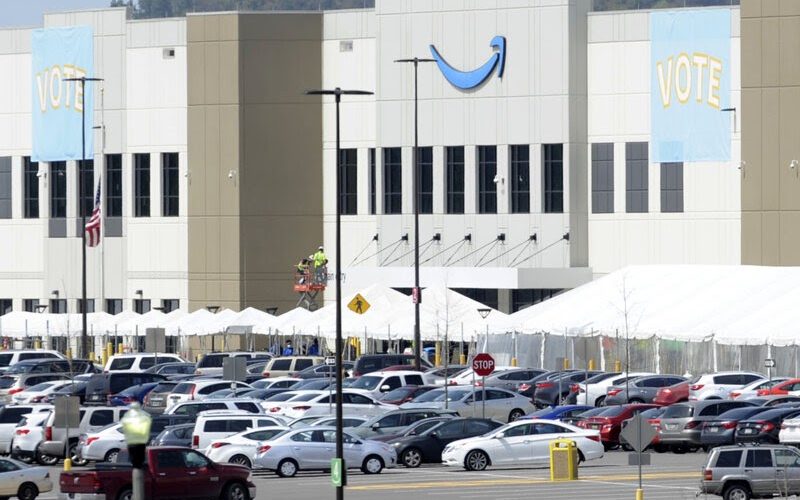On March 29, Amazon workers voted in Bessemer, Alabama on whether to unionize an Amazon fulfillment center. These warehouses store items and workers pick, pack, and ship them out to consumers. The corporation ultimately achieved yet another victory against unionization, with the vote overwhelmingly in favor of not joining the Retail, Wholesale, and Department Store Union. This win for Amazon is the most recent in an over twenty-year history of the corporation’s successful prevention and suppression of unionization efforts. Since the COVID-19 pandemic began, workers put more pressure on Amazon, as they increasingly organize and protest against unsafe working conditions. Subsequently, Amazon has increased its retaliation campaign.
The unionization of Amazon facilities would position many workplace elements out of the corporation’s control, including work pace and hourly pay. The publicly-stated reason Amazon provides for its anti-union push is to preserve direct communication between workers and employers. However, there is more at stake that the corporation is working to keep intact, specifically, complete control over the workplace and its aspects.
Eyewitnesses and news outlets such as Business Insider, Vice, and CNBC have reported on Amazon’s multiple measures to prevent unionization from succeeding, including implementing workplace surveillance to prevent communication among workers. These intimidation tactics have increased significantly since the start of the pandemic.
With the union vote in Bessemer looming, Amazon employed a new strategy; it established an intense social media campaign during the weeks leading up to the union vote to actively combat criticism in an attempt to hijack public optics and present Amazon as a fair, accommodating workplace. In this campaign against criticism, a very troubling pattern of lies and propaganda emerged.
Lies seem to be an inherent constant within the political sphere, now more than ever before. Major actors vie to take control of their narratives—no holds barred—leading to the spread of misinformation perpetuated for the benefit of a few at the expense of the proletariat. Political philosopher Hannah Arendt’s essay “Truth and Politics” gives insight into the lies spread in the marketplace of ideas, a theoretical model to describe exchanges of information. Social media platforms such as Twitter are the modern-day marketplace of ideas, as interactions between all types of entities can occur, including blue-collar workers, politicians, and large corporations. Although these spaces are opportune platforms to spread ideas, information, and first-hand accounts, powerful actors can weaponize them to further their agendas.
Amazon has primarily used two Twitter accounts—@AmazonNews and @Amazon_Policy—to further its anti-union efforts. Account names containing the words “news” and “policy” elicits the impression of unbiased, trustworthy sources simply reporting and commenting on the news. Through these names, Amazon presents the accounts as reputable authorities on the matters they speak on. These handles attempt to mask the inherent bias that a corporation holds, as gaining a profit and public sympathy are their primary goals.
Amazon’s recent social media campaigns involve tweeting rebuttals of criticisms voiced by politicians and high-profile lawyers. Throughout this push, one particular tweet gained widespread attention. US Representative Mark Pocan criticized Amazon’s working conditions, claiming that “paying workers $15/hr doesn’t make you a ‘progressive workplace’ when you union-bust & make workers urinate in water bottles.”
@AmazonNews responded to his tweet with a blatant lie and gaslighting tactic, saying “you don’t really believe the peeing in bottles thing, do you? If that were true, nobody would work for us.” This official Amazon account completely dismissed these occurrences as false despite multiple workers providing testimony and photographic evidence. Arendt provides a sound explanation in the face of such an obvious denial of the truth: actors employ lying to restore and rewrite the image of a public entity, and image-making is crucial because it can offer a “full-fledged substitute” for reality.
Amazon’s huge following on Twitter means that this substitute for reality is broadcast to millions of people, effectively controlling optics. With the previously mentioned tweet, Amazon is attempting to create and strengthen its image as a caring, fair workplace environment that would never force employees to urinate in bottles. The timing of this tweet on March 24 was, of course, no coincidence, as cultivating this image was vital for Amazon to gain sympathy and support from both the public and its workers ahead of the March 29 union vote. This tweet did garner criticism from general Twitter users for its aggressive tone and false contents, as well as from journalists who presented documented evidence disproving it. However, the tweet ultimately aided in challenging and weakening the truth by explicitly combatting claims.
A similar instance occurred with a tweet aimed at Senator Elizabeth Warren and her criticism of giant corporations like Amazon having to pay “close to nothing in taxes.” @AmazonNews replied: “You make the tax laws @SenWarren; we just follow them. If you don’t like the laws you’ve created, by all means, change them.” This tweet simultaneously ignores the lobbying and influence powerful corporations like Amazon have in lawmaking and mischaracterizes the process by saying that one person can make and change the law. Similar to the last tweet, Amazon published it to maintain its image, this time not only as a fair workplace but a law-abiding one as well. These tweets come as corporations, including Amazon, are employing efforts to prevent unionization, which is illegal.
There is a significance to these exchanges happening on Twitter. Powerful corporations have co-opted a space that is often a successful platform for organizing movements, including unionization and workers’s rights. When these accounts enter this marketplace of ideas, they reinforce an extreme power imbalance; it is not a person exchanging ideas with another person, but a massive corporate entity—with all of the associated influence and power—interacting with a person.
In a hypothetical world where Jeff Bezos tweeted about the urinating in bottles situation, laypeople would label his inherent bias more easily and see it as disingenuous. Amazon accounts presenting themselves as unbiased news sources shrouds their true intentions, projecting a reputable image in the face of verified, first-hand accounts and viable criticisms. The possibility of an account with over 175,000 followers directly disputing a claim you made would undoubtedly intimidate anyone wanting to speak out against the corporation, whether it tweeted at you personally or at a politician relaying information you provided.
Amazon is using Twitter as the ideal platform to achieve its goals to effectively present itself as a model, desirable workplace that does not need unions, in part through spreading lies and misinformation. These tactics sway the public and Amazon’s workers against a decision they could be in favor of otherwise. Positive public opinion is a very powerful force. Through incessant lies, Amazon silences dissent. The substitution of reality achieved through lies can cloud the workers’s judgments of what is in their own best interest. This plan most likely aided Amazon as the final vote tally in the Bessemer facility was 738 votes in favor and 1,798 votes against unionizing.
The spread of these lies was detrimental to the unionization effort. They are political lies that have harmful effects on thousands of workers in America by reinforcing a culture riddled with retaliation and even less tolerance toward unions. Corporations should face consequences for spreading lies as rhetoric for suppressing organizing and unionization movements within their facilities. Otherwise, they strengthen the false reality they are trying to impose over time with less and less opportunity for workers to organize. This situation should be watched closely as a cautionary tale for the future of workers’ rights in America.



